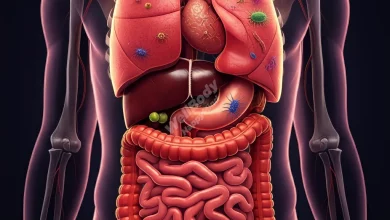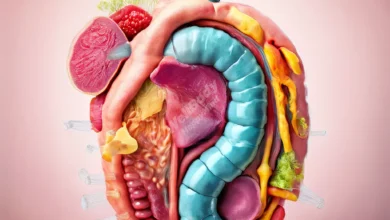The Gut Microbiome: Your Key to Wellness

Have you ever wondered about the hidden world inside your belly? Prepare to embark on a fascinating journey into the realm of your gut microbiome! This invisible ecosystem plays a crucial role in your overall health and well-being.
In this post, we’ll explore the wonders of gut health and how it affects your body and mind. You’ll discover:
- What the gut microbiome is and why it matters
- How your gut influences your mood and mental health
- Practical steps to nurture your gut for better wellness
Are you ready to unlock the secrets of your inner world? Let’s dive in!
What is the Gut Microbiome?
Imagine a bustling city living inside your digestive system. That’s your gut microbiome – a complex community of trillions of tiny organisms that call your intestines home. But what exactly is this microscopic metropolis?
The gut microbiome is made up of various microorganisms, including:
- Bacteria: The most abundant residents
- Fungi: Less common but still important
- Viruses: Yes, even viruses play a role!
These tiny tenants aren’t just freeloaders. They’re hard at work, helping your body in countless ways. From breaking down food to producing vitamins, your gut microbiome is a key player in your overall health.
But why should you care about these microscopic helpers? Here’s why:
- Digestion: They help break down food and absorb nutrients.
- Immune system: A healthy gut means a stronger defense against illness.
- Mental health: Believe it or not, your gut influences your mood!
Research shows that a diverse and balanced gut microbiome is linked to better health outcomes. On the flip side, an unhealthy gut might lead to various issues, from digestive problems to mood disorders.
As we continue our journey, you’ll learn how to nurture your gut microbiome for optimal wellness. But first, let’s explore the fascinating connection between your gut and your brain in the next section.
The Gut-Brain Connection
Did you know your gut and brain are in constant communication? This remarkable relationship is known as the gut-brain axis. It’s like a bustling highway of information, with messages zipping back and forth between your belly and your brain.
Here’s how this fascinating connection works:
- Your gut sends signals to your brain through nerve pathways
- Hormones produced in the gut influence brain function
- The gut microbiome produces neurotransmitters that affect mood
This two-way street has a significant impact on your mental health. In fact, some scientists call the gut our “second brain”!
Recent studies have shown some intriguing links:
- A healthy gut may lead to improved mood and reduced anxiety
- Certain gut bacteria might help alleviate symptoms of depression
- Probiotics (good bacteria) could potentially boost cognitive function
While research is ongoing, it’s clear that taking care of your gut is crucial for both physical and mental well-being.
Factors Affecting Gut Health
Now that we understand the importance of gut health, let’s explore what influences it. Your gut microbiome is like a delicate garden – it needs the right conditions to thrive.
Here’s a comparison of factors that can help or harm your gut health:
| Positive Factors | Negative Factors |
|---|---|
| Fiber-rich diet | Processed foods |
| Regular exercise | Sedentary lifestyle |
| Adequate sleep | Chronic stress |
| Probiotic foods | Overuse of antibiotics |
| Staying hydrated | Excessive alcohol consumption |
Let’s break these down further:
Diet and Nutrition
- A diverse, plant-based diet nourishes beneficial gut bacteria
- Processed foods and excess sugar can disrupt the microbial balance
Stress and Lifestyle
- Chronic stress can negatively impact gut health
- Regular exercise promotes a healthy gut environment
Medications
- Antibiotics, while sometimes necessary, can wipe out good bacteria along with the bad
- Always follow your doctor’s advice on medication use
Environmental Factors
- Exposure to nature and diverse environments can enrich your microbiome
- Overuse of antibacterial products may reduce beneficial bacteria
By understanding these factors, you can make informed choices to support your gut health. In the next section, we’ll explore signs that might indicate an unhealthy gut and what you can do about it.
Signs of an Unhealthy Gut
Your gut has ways of telling you when it’s not happy. Being aware of these signs can help you take action early. Here are some common symptoms that might indicate an unhealthy gut:
- Digestive Issues:
- Frequent bloating or gas
- Constipation or diarrhea
- Heartburn or acid reflux
- Mood Changes:
- Increased anxiety or depression
- Mood swings
- Difficulty concentrating
- Skin Problems:
- Acne or eczema flare-ups
- Unexplained rashes
- Other Signs:
- Unexplained weight changes
- Frequent infections
- Chronic fatigue
Ignoring these signs can lead to long-term health risks, including:
- Increased inflammation
- Weakened immune system
- Higher risk of chronic diseases
If you’re experiencing persistent symptoms, it’s always best to consult with a healthcare professional.
Nurturing Your Microbiome: Practical Steps
Now that you understand the importance of gut health, let’s explore how to nurture your microbiome:
Dietary Changes Your diet plays a crucial role in maintaining a healthy gut. Focus on:
- Fiber-rich foods: Fruits, vegetables, whole grains, and legumes
- Probiotic foods: Yogurt, kefir, sauerkraut, and kimchi
- Prebiotic foods: Garlic, onions, leeks, and asparagus Avoid or limit:
- Processed foods
- Excessive sugar
- Artificial sweeteners
Lifestyle Modifications Your daily habits can significantly impact your gut health:
- Manage stress: Try meditation, yoga, or deep breathing exercises
- Exercise regularly: Aim for at least 30 minutes of moderate activity daily
- Prioritize sleep: Aim for 7-9 hours of quality sleep each night
Supplements and Probiotics While a healthy diet should be your primary focus, supplements can help:
- Probiotic supplements: Look for products with diverse strains
- Prebiotic supplements: These feed your good gut bacteria
- Always consult with a healthcare professional before starting any new supplement regimen
The Future of Microbiome Research
The field of gut health is rapidly evolving. Here are some exciting developments to watch:
- Personalized nutrition based on individual microbiome profiles
- Microbiome-based therapies for various diseases
- Advanced probiotics designed for specific health conditions
Conclusion
Your gut microbiome is a powerful ally in your journey to overall wellness. By nurturing this invisible ecosystem, you’re investing in your physical and mental health.
Remember:
- Eat a diverse, plant-rich diet
- Manage stress and prioritize sleep
- Stay active and hydrated
- Listen to your body’s signals
Start your gut health journey today! Small changes can lead to significant improvements in how you feel and function. If you have concerns about your gut health, don’t hesitate to consult with a healthcare professional.
Here’s to a happier, healthier you – from the inside out!



